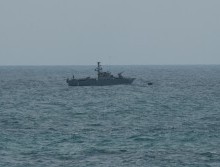It had seemed so important, answering that phone call. Until I looked up and saw a car practically stopped in front of me as I was traveling 45 MPH on the highway. That was my first and only real car accident, almost one decade ago. The problem wasn’t that I wasn’t a good driver. The problem was that I wasn’t looking ahead.
Thankfully no one was hurt then. But that won’t be the case if the West doesn’t look ahead and look out for an Iran that’s now sending warships into the Atlantic Ocean. Ambition is a dangerous thing. Ambivalence in the face of it is even worse. The Bible has some advice for avoiding that.
In the years leading up to Jerusalem’s first Jewish exile, the people of Israel lost their vision. Too many stopped thinking about the consequences and then one day the consequences started thinking about them. Lamentations 1:9 says that Jerusalem “took no thought of her future; therefore her fall is terrible.”
Decades later, many Jews would learn this lesson and put in safety nets to prevent such sinfulness from reoccurring. That process of building fences to protect holiness continues today in Judaism. Better to err on the side of caution, especially when it comes to sin.
At the end if the day, it’s vital to think about the results of your actions – and in some cases the actions of others. Will saying that comment damage the relationship? Will eating that piece of cake kill your diet?
Will just watching Iran expand it’s reach result in worse bloodshed?
Obviously, the threats and seriousness of these consequences vary. And in some cases, it’s ok to be “wise in your foolishness,” as my mother-in-law advises.
But that’s why we look ahead and consider. We may convince ourselves we can always change tomorrow, but we need to do it today. Or it may not seem so bad to us, but what will it lead to?
One of the best at this was Jacob in the Bible. The clever Jacob had acquired a blessing, rightfully his, that Esau had expected to get. Essay’s hatred and bitterness drove Jacob into exile. Esau had planned to kill Jacob, and probably would have.
And yet, years later, Esau welcomed Jacob back in a tearful reunion. He even offered to travel with Jacob, with his army offering protection. But Jacob knew better. He knew Esau didn’t meet him with hundreds of men for no reason. He knew the threat was still real.
So he declined and gave an excuse. And in so doing, he likely prevented a massacre while he slept.
Today, we need to apply that to Iran. It’s a frightening hint of what’s coming when a Middle East nation, with no naval history of traveling to the oceans between the US and Europe, decides they want to send multiple warships as a show of defensive capabilities, as one Iranian told Fars News Agency. The answer to that threat isn’t to start shooting, but definitely to start preparing.
Are we watching Iran closely? Are we trying to understand their actions? Are we looking ahead with a cautious eye to what it could mean?
Similarly, there may be bad habits or sins in our lives whose consequences may be years down the road. But are we considering our future? Are we calculating the cost of our actions? If we do so, we will see the need to make changes now. That “little white lie” is eroding our honesty and building a world of mistrust. So start telling the truth now.
That lack of punctuality is irritating others and could lead to getting fired from a job. It’s time to start being on time, now.
Whether you run the military of the United States or whether you’re a college student trying to make it through freshman English, you need to consider the future and start preparing for it now. Make changes now. Starting looking ahead and look out.
Otherwise, when you finally look up, it may be too late.
(By Joshua Spurlock, www.themideastupdate.com, January 26, 2014)
Scripture quotations are from the ESV® Bible (The Holy Bible, English Standard Version®), copyright © 2001 by Crossway Bibles, a publishing ministry of Good News Publishers. Used by permission. All rights reserved.

